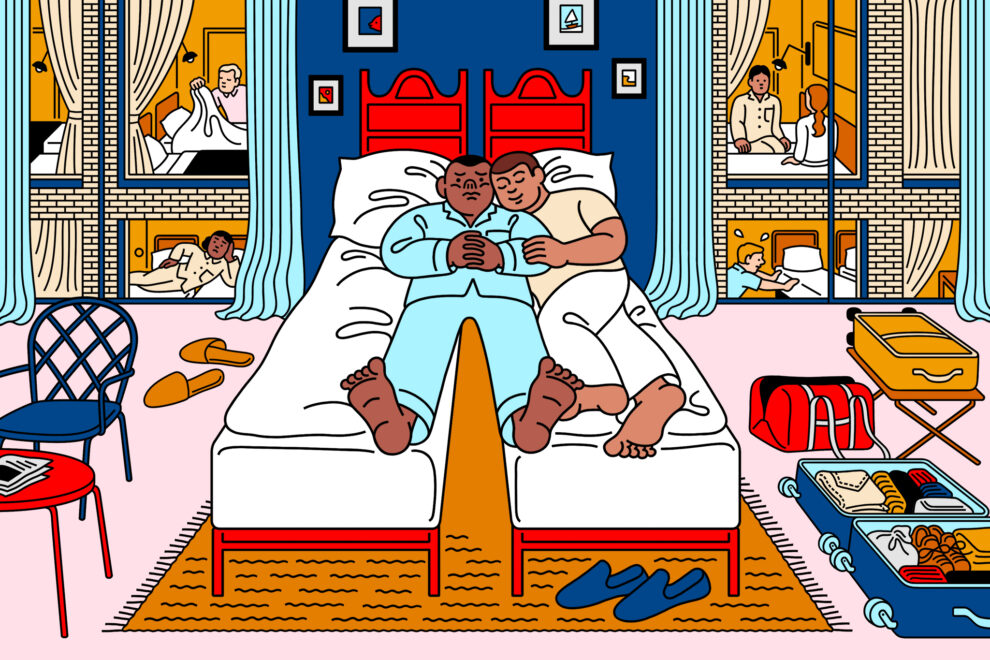Seven days after Nicole Dunn got back home to California from her trip to France and England, she still hadn’t recovered. It wasn’t jet lag. It wasn’t the blues that hit after a vacation’s over, either.
Rather, it was another case of bad hotel bed, an affliction that plagues countless unsuspecting travelers in Europe. Dunn says her mattress at the Angel Islington Hilton Hotel in London was so firm, it didn’t just ruin her sleep, it left her in pain long after checkout.
“I’m on the way to the chiropractor,” Dunn, CEO of the public relations firm Dunn Pellier Media, said on a phone call from her car en route to her checkup. “I can still barely move.”
Coming from the United States, where you can expect a decent mattress without splurging on a luxury accommodation (looking at you, Hampton Inn), Americans are routinely dismayed by their hotel beds across the pond. Old-world charm only goes so far when you end up trying to sleep on something lumpy, short, bunk, twin, or, as in Dunn’s case, “rock hard.”
Ben Pundole, the executive vice president of brand culture and experience for Public Hotels says for the most part, hotel beds in Europe aren’t as comfortable as ones in the U.S. — at least not to American travelers. But they come with the territory. Hard beds, small beds, separate little beds are “very accepted in Europe, especially amongst, I would say, an older generation,” he said. “It’s a very different hotel sleeping culture.”
It’s not just a Europe problem. America’s preference for plush mattresses, box springs and fluffy pillows doesn’t translate well in many of the places we travel, from Japan with its traditional tatami mats and firm “Western-style” options to the concrete bed bases of Mexico.
Two beds for the price of one
Hans Mast, a travel agent for Golden Rule Travel, remembers a morning on one of his group tours through Europe when an older client grabbed the bus microphone to share a story.
“He said ‘I had quite the experience last night … I leaned over to kiss my wife and ended up on the floor,’” Mast said.
The bed — to the surprise of the traveler — was made of two twin beds pushed together, which is common in European hotels — another fact unbeknown to the traveler.
“That’s culturally very European,” said Pundole, who’s also the founder of the blog A Hotel Life.
Gareth Boyd, a former hotel owner who lives in Belfast, says the practice is rooted in tradition.
“Historically, many hotel rooms were designed for individual travelers or same-gender colleagues who would share a room but not a bed,” Boyd said in an email.
The arrangement gave travelers a less-intimate sleeping arrangement, and “it has a lot more flexibility for hotels,” said Mast, as two twin beds can be separated to accommodate more configurations of travelers than a king bed can.
Born and raised in the United Kingdom, Pundole says it’s not much of an issue in England, but it’s particularly common in Germany, the Netherlands and Italy.
Travel writer Brad Japhe, who lives in London, has seen it most in Italy and Scandinavia — and not just at budget hotels, but properties in the three- and four-star range, too.
“Certainly you’d be shocked if it did happen in an [American hotel] where you spent $200 a night and above,” Japhe said. “But it’s kind of par for the course on this continent.”
What bothers Japhe more than two distinct mattresses is when the beds are made up separately.
“The idea that you could have this half-sized comforter that’s only fit for half the bed … that’s a bridge too far for an American sensibility,” he said.
European travel expert Rick Steves says Americans travelers should expect regional differences in bedding (although you may find some American-style pillows or extra bedding in the closet or at the front desk). For example, “Don’t be confused if your top sheet is ‘missing,’” Steves said in an email. “Especially in northern Europe, many hotels use covered duvets instead of a top sheet.”
“In France, some beds have pillows that are shaped like a wedge or a log,” Steves continued. “And in warm climates, you may only have a sheet, and no comforter.”
Prioritizing health over comfort
When Dunn told the front desk staff about her backbreaking mattress, the hotel employee was unapologetic. Her husband finagled a room change, but the next bed was no different.
That may be because firm mattresses have a reputation for being healthier, “and Europeans are notorious for taking health over comfort,” Mast said.
Boyd says European mattresses are typically firmer because of the preference for stronger back support, which some believe leads to a better night’s sleep. Pundole feels the same, both that sleeping on harder beds is better for you and that’s a cultural divide that separates Americans from Europeans.
“Americans like things plush and comfortable and I think Europeans are a little more practical and pragmatic,” Pundole says. “I think that reflects in even our kind of mattresses.”
‘It’s an issue’
For a trip to Rome in 2019, travel writer Jenn Rice booked a hotel on a “mega budget” knowing that it wouldn’t be Instagram-worthy, but at the bare minimum she assumed she’d fit on the bed. She was wrong. When Rice arrived at her booking, the photos of the room weren’t remotely close to what she’d seen online. While her reservation had been for a double, “it was a twin,” Rice remembered. “But like, smaller.”
Too tall for the bed at 5-foot-8, Rice had to open the window at the foot of her bed and stick her feet out in order to life flat.
“I cried,” she said. The next day, she abandoned ship and found a different hotel.
Alli Allen, a luxury travel adviser with Travel Edge, says she gets frustrated calls from clients in Europe about small beds.
“It’s an issue,” she said. “They tend to call all beds doubles there … the wording is confusing.”
But space comes at a premium in Europe, which can dictate a hotel’s bed situation.
“The really nice luxury hotels have bigger rooms. … They’re more apt to offer a king or two queens,” Allen said. Conversely, “most normal hotels, maybe a four-star, the rooms are small,” and need to have smaller beds accordingly, Allen added.
A good night’s sleep could cost you
Dunn’s trip wasn’t all bad. Before she got to London for a work conference, she’d traveled to France to celebrate her 10-year anniversary with her husband, Val. In Paris, Dunn stayed at the five-star boutique Hôtel San Régis, and in Cannes, the recently renovated four-star Hôtel Croisette Beach Cannes MGallery. “Those hotels were fantastic,” Dunn said. “I slept like a baby.”
The moral of the story will come as a surprise to no one: To increase your chance of getting a better bed, stay in a better hotel.
“I think you get to a certain level of luxury where without a doubt, no matter what, they’re going to have the bed situation dialed in,” Japhe said.
Pundole says travelers should be aware that booking a two- to three-star hotel in Europe are more likely to get those traditional European bed experiences (twins, very firm). “Once you hit the lifestyle hotels or the five-star hotels, then it becomes like it is here in America,” he added.
Mast says staying at a big chain hotel may also help.
“Those international chains — like Hyatt, Marriott, IHG, Hilton — they do have international bed standards,” he said.
But as Dunn discovered at her international chain in London, it’s not a foolproof solution.
To avoid disappointment, Allen talks to hotels or the travel suppliers she works with to make sure the beds will fit her clients. Pundole and Steves recommend travelers do the same — and be clear about your needs.
“If you’re tall, just let the hotelier know you’d prefer a longer bed without a footboard,” Steves said. “And if you’d like a double bed, be sure to specifically ask for one, as a ‘double room’ can also mean two twins.”
Boyd notes that these are general observations, and beds can vary significantly across Europe, “even from hotel to hotel within the same city,” he said. Instead of dreading your bedding, Boyd says you can embrace what you get as a travel experience.
“As with many aspects of travel, hotel bedding configurations offer an interesting lens through which we can understand and appreciate cultural differences,” he said.
Source: The Washington Post















